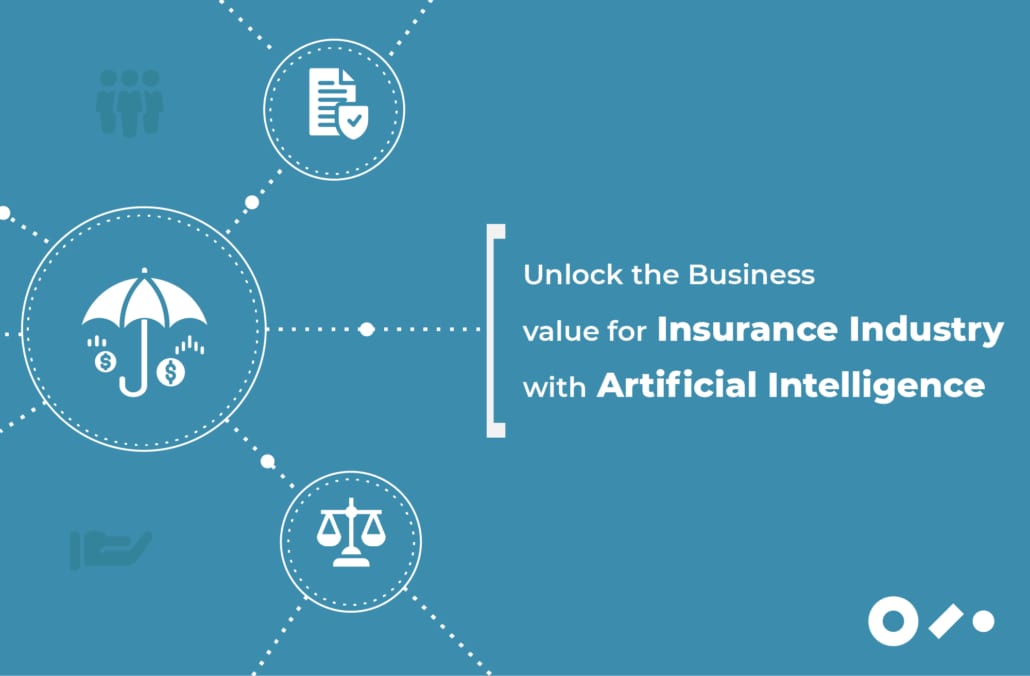AI for Insurance Industry

AI programming that can think and learn like a human has become a trendy expression in the Insurance business. Today for the Insurance domain, AI for Insurance industry can perform explicit assignments — like checking an insurance claim for fraud. However, people today or in the future will be fit for tackling complex issues and making decisions.
Artificial Intelligence will transform the Insurance Industry significantly in the future. Insurers are looking at AI, which will assist various stakeholders in the process, such as employees and agents, and brokers, to uplift customer satisfaction. With automated processes and faster processing of claims, the customer experience will definitely be heightened.
From a business point of view, AI in Insurance can help automate work processes efficiently with lower error margins, prompting lower costs and saved time.
AI for Insurance Industry
Insurance, which uses bunches of information and redundant cycles, has been an early adopter of AI. There are many instances of how insurers worldwide are executing AI to improve their primary concern in areas of claims management, fraud detection, and customer experience.
From a business point of view, AI can help the Insurance industry in operations by automating tasks quicker, less expensive, and more exact way.
Artificial intelligence can likewise be leveraged to comprehend clients better — organizations can utilize AI to analyze the data they have on clients to foresee client behavior, get preferences, and improve cost and products offered.
AI for Insurance industry can mainly impact in:
- Speeding up claims processing
- Delivering excellent customer Service
- Fraud prevention with early fraud detection
Thus, AI for Insurance industry can possibly change the experience for clients from disappointing and administrative to something quick, on-demand, and more moderate. Customized Insurance products will draw in more clients at more pleasant costs.
AI in claims management can redefine the repetitive tasks with shorter turn around times in settlements to increase customer satisfaction. With a better analysis of customer behaviors, insurers will be able to offer more flexible insurance and premiums that adapt to customer needs.
In the coming years, we will see Insurance become more customized, in the fact that insurers utilizing AI tech will have the option to see better what their clients need. Insurers will be able to see cost savings by accelerating work processes.
Areas where AI can contribute
AI is an innovation that empowers computer systems to achieve tasks that ordinarily require a human’s intelligent behavior. For example, a solution that does data gathering, data analysis, and decision making can end up changing the insurance industry.
The common pain points faced by the Insurance business are:
- Ensuring quicker claim support
- Detecting frauds and rejecting false claims
- Customer Analysis for tailored insurance
Claims Management:
Today AI & Intelligent process automation solutions such as Simplifai’s Digital Employee Chris for claims coordination can classify the claim, catch the damage, update the system as well as check the claim’s legitimacy. They can even interact with the client without the client expected to visit an actual office. This arrangement is most applicable post – COVID 19, where the focus has moved to digital transactions.
Simplifai’s Digital Employee, Chris the Claims Coordinator, can, for example:
- Receive claims by chat, email, or portal
- Interpret content and intention
- Use rules to decide the course of action.
- Categorize claims based on type and topic
- Handle and archive claims documents
- Validate customer
- Retrieve data, register and update internal systems
- Verify policy details
- Request for additional information
- Forward inquiry to relevant stakeholders
- Alert damage control
- Reply to sender
This is the best case of how claims with standard documentation can minimize human efforts and can be looked into by bots, subsequently saving money on the labor force for Insurance giants and convey instant client help.
Fraud Detection:
Fraud management has been painful for the Insurance industry. AI can reveal correlations and examples already undetectable to the human eye, making it valuable for recognizing fraudulent behavior.
How can AI for insurance industry help in Fraud Detection?
- Fraud detection with AI assists to complete data analysis in practically no time. It detects complex patterns in the most efficient way, which can be difficult for the human eye to recognize.
- Artificial intelligence can likewise be utilized to constantly monitor employee and client conduct to search for patterns showing large-scale fraud. A client making odd claims or a debt-ridden employee making large financial transactions – these are potential warning that AI can feature for further investigation.
- Insurance companies may likewise utilize visual analytics to survey auto or property damages based on pictures and recordings.
- Comparing new claims with the existing data, AI in the insurance industry can help identify unusually high and most likely fake claims.
Customer Analysis:
We are all aware that insurers are dealing with an enormous amount of unstructured client data. AI for insurance industry can utilize this very data to make more important showcasing material, offer customized service, and sell the correct product to the correct client through proper focusing and profiling.
How can AI help in tailored insurance:
- Tailor-made insurance will attract more customers at fairer prices.
- Flexible insurance such as on-demand pay-as-you-go insurance
- Offer more flexible insurance and premiums that adapt to customer needs.
The future of AI in Insurance
Today AI has become an integral part of our lives. Artificial intelligence began in client assistance, constantly refining AI algorithms have extended its applications to various perspectives, such as claim management, fraud detection, and risk assessment.
Quoting Mckinsey & Company article: Claims processing in 2030 remains a primary function of carriers, but headcount associated with claims is reduced by 70 to 90% compared with 2018 levels.4. Advanced algorithms handle initial claims routing, increasing efficiency and accuracy. Claims for personal lines and small-business insurance are largely automated, enabling carriers to achieve straight-through-processing rates of more than 90% and dramatically reducing claims processing times from days to hours or minutes.
Want to know more about automating Claims Coordination? Read more about our Digital Employee Chris, the Claims Coordinator, here.


